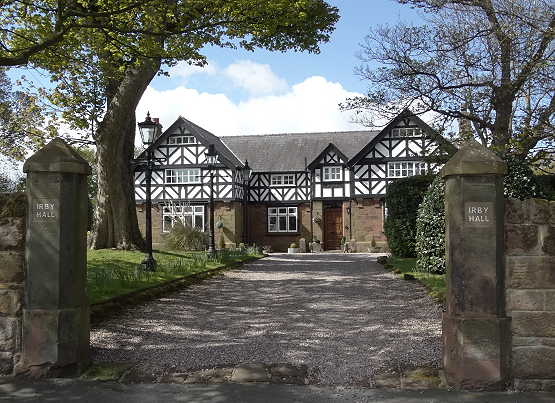Irby is a village on the Wirral
Peninsula, England. The village covers an area of 20 square kilometres. To the
north of Irby lies the associated hamlet of Irby Hill.
The name Irby is believed to be of
Viking origin, meaning; "the settlement of the Irish". Other nearby towns and villages with the
Viking "by" suffix in their name include Frankby, Greasby and Pensby,
where I live.
The village was formerly a township in
Woodchurch Parish, Wirral Hundred, Cheshire County. On 1 April 1974, local government
reorganisation in England and Wales resulted in much of Wirral, including Irby,
transferring from the county of Cheshire to Merseyside. As an administrative entity Merseyside was
subsequently abolished leaving many inhabitants unsure where on earth they
live!
The population was 96 in 1801, 180 in
1851 and 146 in 1901. According to the 2001 Census, Irby had a population of
6,110. Whilst not being diverse in terms
of ethnicity, Irby is an economically diverse neighbourhood, possessing a
mixture of large 1930s built private houses together with an estate of 1970s
built homes in a range of sizes and an element of 1950s built council housing
all in close proximity. In this respect it is regarded locally as a desirable place to live.
The small shopping area has a varied
selection of shops including a barber whose dog seems to find life pretty
enjoyable.
Despite the typically suburban character
of most of its neighbourhoods, Irby is surrounded on all sides by a large
amount of green belt and woodland.
Most of the old buildings in the village
are constructed of sandstone which is the largely hidden bedrock underlying the
visible boulder clay.
The view from the crossroads by the
library stretches across the River Dee to the hills of Wales.
Outside the library are the village
stocks.
A reference to the existence of a mill
at Irby was made in a rental agreement of 1431, whereby tenants were expected
to "...grind at Irby Mill to the 16th measure." This referred to the
miller receiving this amount in flour as a toll. This original wooden structure
was replaced by a post mill in the early 18th century. After being disused
since about 1878 and in a very dilapidated condition, the mill was demolished
in 1898. Along with a similar structure
in Burton, it was one of the last post mills of its kind on the Wirral. The demolition work was carried out by unskilled
labour hired by the miller. They removed the brick base first, resulting in the
whole structure becoming dangerously unsafe and crashing to the ground,
narrowly avoiding injury and loss of life.
The Irby Mill public house, which
opened for business in 1980, stands adjacent to the site in a building formerly
known as 'Irby Mill Cottage'.
The Anchor Inn is one of the oldest
buildings in Irby, and, according to an entry in the BBC Domesday Project, was
built as a cottage in the 17th century.
The Shippons is a sandstone village pub,
which was converted from old farm buildings.
As can be seen from these two photos the
inn sign has recently been repainted and cows have been added to the farmyard. Since shippon means cow-shed or cow barn it
is only right that the sign should include some cows
The village has a nice cafe as well - Aroma.
It is often a bit noisy but it does great cappuccino and lovely scrambled egg with smoked salmon.
Nearby Irby Hall was constructed in the early
17th century, with an entrance façade added in 1888.
The hall was built on the site of an
11th-century moated manor and courthouse of St Werburgh's Abbey. The moat is now dry, but has a prominent
outer bank. Irby Hall was made a Grade
II listed building in 1962.








































































The places I should visit but never will. Thanks for this look round.
ReplyDeleteThank you for this interesting excursion in and beautiful pictures from your wider neighbourhood!
ReplyDeleteUp in Yorkshire, there are many places with Viking names, such as Thirsk, York (Yorvik) and many -bys (Kirkby, for instance). I've been to Denmark and Bornholm several times, and near where my aunt lives is a small town named Akirkeby, so I made the linguistic connection the moment I first saw these place names on my very first Yorkshire Holiday 16 years ago.
I would have never guessed that "shippon" has anything to do with cows!
Gosh CJ that brought back so very many happy memories (not a few of which were spent in The Anchor in the days when I often used to stay at Ron and Leslie's meaning no driving). Oddly I seem to recall when you and I've been in that the café wasn't exactly a quiet place but that's probably a good sign in many ways. I'll doubtless be down this summer and perhaps we'll get more exploring done. I might not climb the rock at Thurstaston though.
ReplyDeleteWhat a lovely place, thanks for the visit. Love learning about place names and suffixes. Now I'll know when some place is of Viking origin.
ReplyDeleteSuch an interesting place and history. If i could get away for a month, it's the kind of quiet place i'd like to stay!
ReplyDeleteWow nice to see Irby hall again as I used to live there. My Dad bought it in 1970 and renovated it.
ReplyDelete